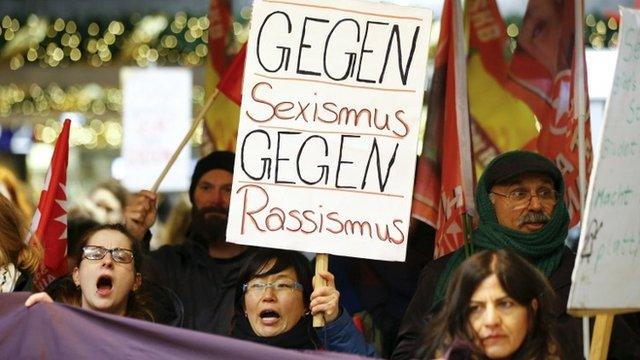Cologne sex attacks: Germany's De Maiziere criticises police
- Published
One woman described how a firecracker put in her hood has left her scarred for life
German Interior Minister Thomas de Maiziere has strongly criticised police handling of gang attacks on women and girls in Cologne on New Year's Eve.
"The police shouldn't work like this," he said, as it emerged that three suspects had been identified.
More than 100 victims have complained of being sexually assaulted or robbed by gangs of up to 30 men, reportedly of Arab or North African appearance.
Officials say the violence should not cast suspicion against all refugees.
A crowd of about 1,000 men had gathered in the square outside Cologne station during New Year's Eve, letting off fireworks. Many were drunk and aggressive.
Police eventually evacuated the area because of the risk of injury from the fireworks.
But gangs of youths soon returned and carried out dozens of attacks over a number of hours with little apparent response from the local authorities until well after midnight.
Cologne mayor's 'code of conduct' attacked
Two women in Cologne have told police they were raped and many were groped, including a volunteer policewoman. Justice Minister Heiko Maas said the attacks appeared to have been co-ordinated and spoke of "a new scale of organised crime".
Women were also targeted in Hamburg and Stuttgart. More than 30 complaints have been filed by women saying they were indecently assaulted or robbed on Hamburg's Reeperbahn.
Police in Stuttgart say several women were attacked at Schlossplatz in the city centre.
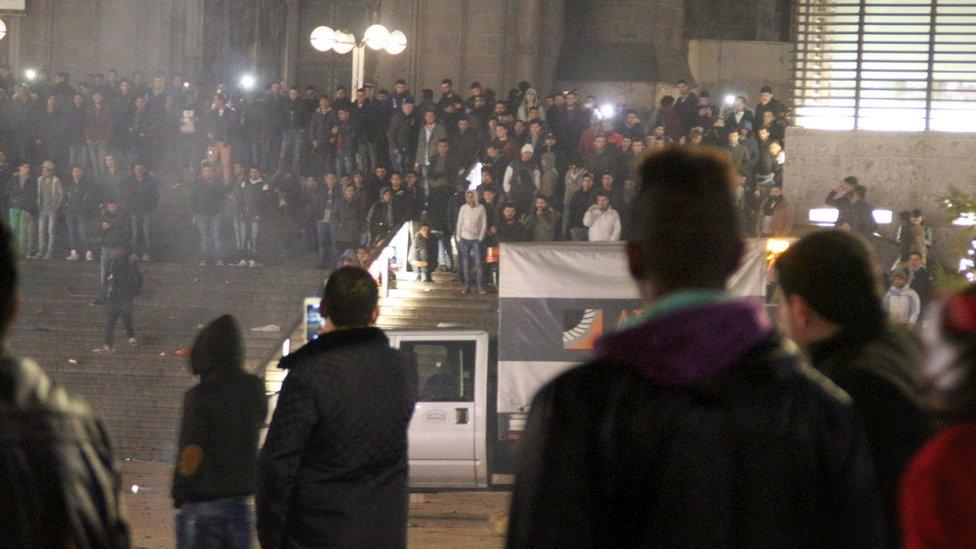
Witnesses described being intimidated throughout the evening by large groups of youths
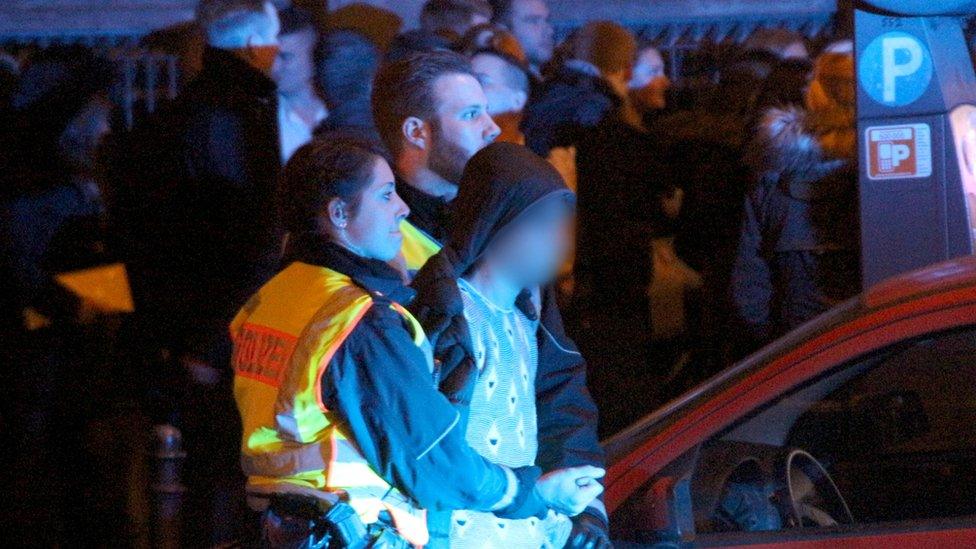
Police in Cologne acknowledged they had been slow to respond and the police union blamed poor resources
Hundreds of people protested near Cologne station on Tuesday night, angered by the brazen attacks and by the slow response of political leaders.
Chancellor Angela Merkel expressed outrage over the "disgusting attacks" and the interior minister was asked about the police response on national TV.
Mr de Maiziere criticised police for allowing the attackers to return. The square was evacuated, he said, "and then later these events take place and they wait for complaints. The police shouldn't work like this".
The widespread identification of the attackers as North African or Arab in appearance has also caused considerable alarm because of the influx of more than a million migrants and refugees in the past year. Many of the incomers have fled the conflict in Syria.

Cologne's night of violence
One man described how his partner and 15-year-old daughter were surrounded by a crowd outside the station and he was unable to help.
"The attackers grabbed her and my partner's breasts and groped them between their legs."
A woman, named Busra, told German television the ordeal was "truly terrible".
"They felt like they were in power and that they could do anything with the women who were out in the street partying. They touched us everywhere," she said.
Female residents of Cologne speak out over the New Year's Eve assaults
Another woman was robbed of her mobile phone at the station entrance after midnight and went to police to report it. "There were lots of girls, all crying uncontrollably."
And a British woman visiting Cologne said fireworks had been thrown at her group by men who spoke neither German nor English. "They were trying to hug us, kiss us. One man stole my friend's bag," she told the BBC.
"I've been in scary and even life-threatening situations and I've never experienced anything like that."

The "anti-Islamisation" Pegida movement and the right-wing AfD said the attacks were a consequence of large-scale migration. AfD leader Frauke Petry asked if, after the attacks, Germany was now sufficiently "diverse and cosmopolitan".
Mr de Maiziere emphasised there should not be any general suspicion towards refugees, at least "at this stage of the investigation".
"But if North Africans were the perpetrators, for which there is some indication, there should not be a taboo and people should not gloss over it."
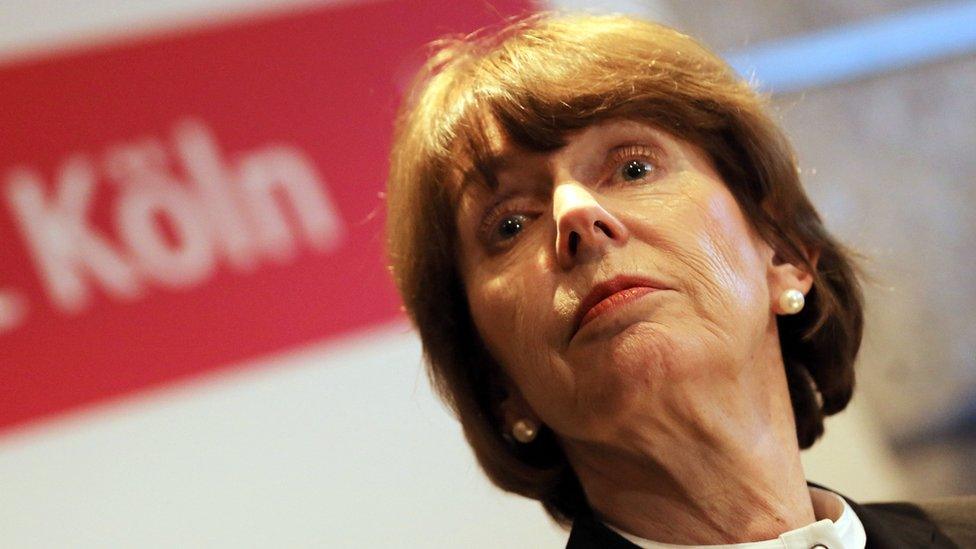
Cologne Mayor Henriette Reker was mocked on social media for her advice to young women
Cologne Mayor Henriette Reker had earlier said it was "completely improper" to link the attackers "who appeared to come from North Africa" with refugees.
But she was herself mocked for urging young women and girls to adopt a code of conduct that meant keeping an "arm's length" distance from strangers and sticking with a group of people.
'New dimension'
North Rhine-Westphalia Interior Minister Ralf Jaeger told journalists on Wednesday that three suspects had been identified, although no arrests had been made.
He warned that anti-immigrant groups were trying to use the attacks to stir up hatred against refugees.
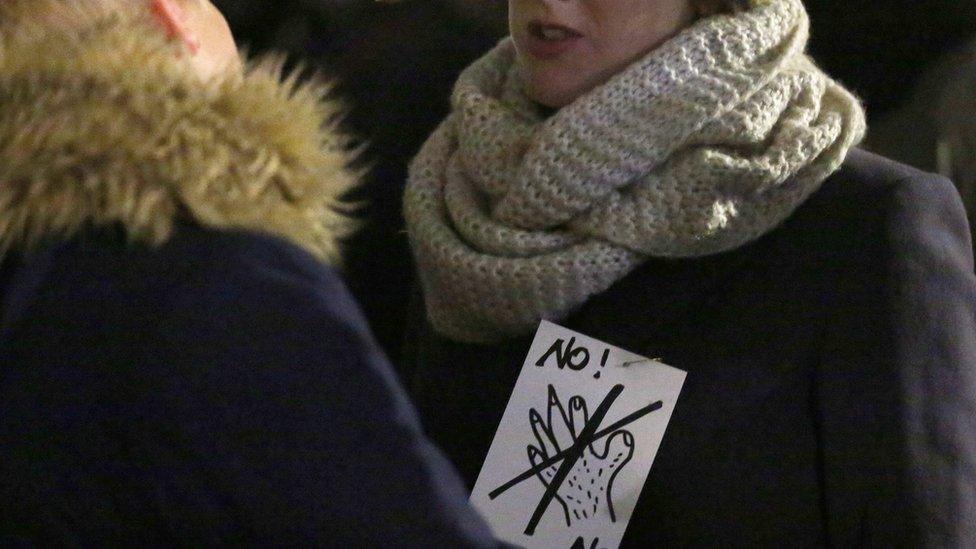
Up to 300 people, mostly women, demonstrated outside the station on Tuesday
Cologne police chief Wolfgang Albers has rejected criticism of his force, describing what happened as "a completely new dimension of crime".
But police union chief Rainer Wendt said a lack of resources meant that the Cologne force had been unable to clear the square properly.
Mr Wendt was critical of the Berlin government, arguing that federal officers who had the task of policing the station itself had been deployed in recent months to strengthen border security in Bavaria.
Cologne authorities are particularly concerned that the attacks may hit the city's reputation ahead of its February carnival, when hundreds of thousands of revellers are expected on the streets.

Were you in Cologne and the other affected areas on New Year's Eve? Have you taken part in subsequent protests? Email your stories to haveyoursay@bbc.co.uk, external.
Please include a contact number if you are willing to speak to a BBC journalist today. You can also contact us in the following ways:
WhatsApp: +44 7525 900971
Tweet: @BBC_HaveYourSay, external
Text an SMS or MMS to 61124
- Published8 January 2016
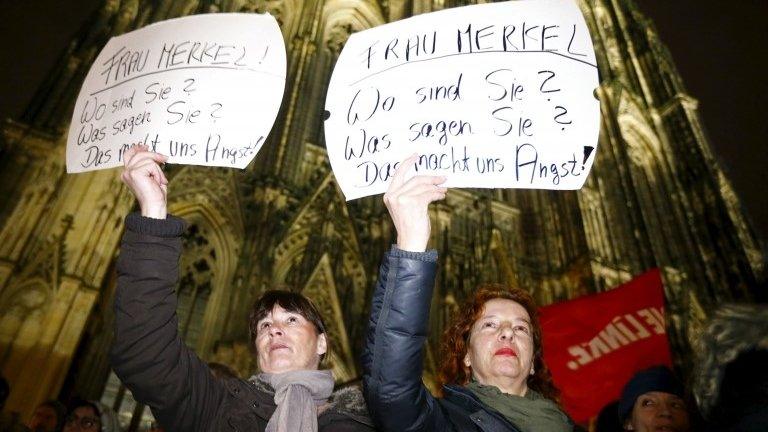
- Published6 January 2016
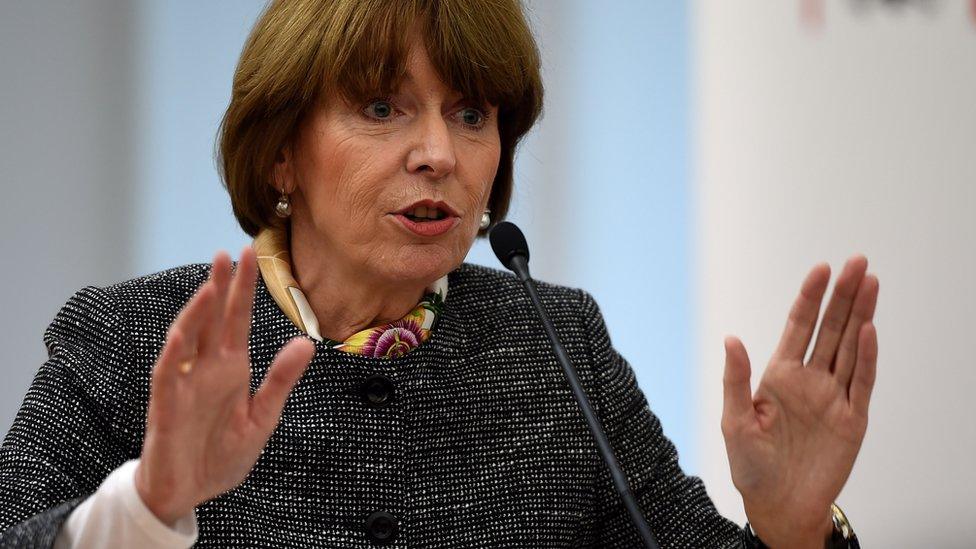
- Published6 January 2016

- Published5 January 2016
